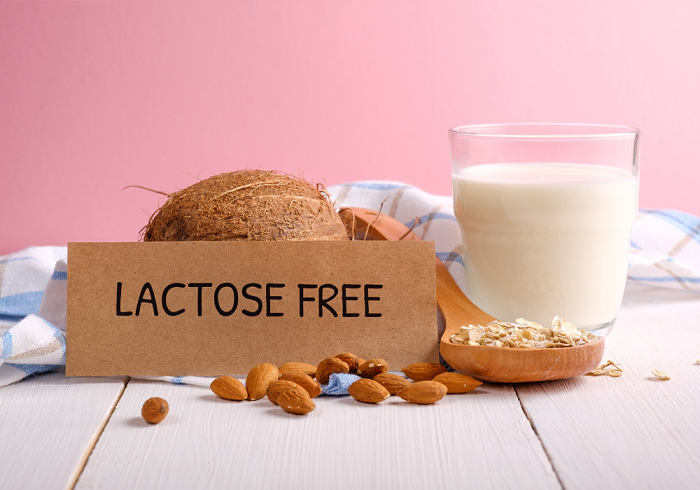There are a large number of people around the world who suffer from digestive disorders due to a lactose intolerance. After consuming milk or products containing milk, these individuals may exhibit symptoms caused by their inability to effectively digest lactose, which is a sugar present in dairy products, due to a lactase deficiency.
These symptoms can be bothersome and uncomfortable for those who experience them.
But don't worry, this digestive issue won't ruin your life because There are several ways to manage this intolerance.. In this article, we will explore how to recognize lactose intolerance, its symptoms, the cause of this condition, the foods to avoid, and how to manage its episodes to live more comfortably on a daily basis.
What is lactose intolerance ?
First of all, let's start with a few definitions:
Lactose: It is the sugar contained in milk and dairy products.
Lactase: It is the enzyme responsible for the breakdown of lactose and is produced in the small intestine.
Glucose and galactose: The two products that result from the decomposition of lactose are two simple sugars that are then easily absorbed by the intestinal wall.
So, lactose intolerance is a digestive disorder that occurs when the body has difficulty digesting the main sugar present in milk: lactose. This is due to a deficiency or absence of lactase, which is the enzyme responsible for making lactose more digestible by breaking it down into simple sugars (glucose and galactose) so that it can be easily absorbed into the bloodstream. This leads to a series of unpleasant digestive symptoms that usually occur a few hours after consuming foods or drinks containing lactose.
It is important not to confuse lactose intolerance with a milk allergy. Lactose intolerance, as we mentioned earlier, is an enzymatic problem related to the digestion of milk sugar, whereas a milk allergy is an immune system reaction to milk proteins.
How to recognize lactose intolerance ?
Lactose intolerance is manifested by symptoms that appear after consuming milk or dairy products, usually within a few minutes to a few hours after consuming these foods.
Common symptoms are:
- Stomach aches
- Bloating
- The gases
- Diarrhea
- Abdominal cramps
- And sometimes nausea and vomiting
If you suspect lactose intolerance, you might consider eliminating dairy products from your diet for 2 or 3 weeks to see if your symptoms decrease. If you notice that the mentioned symptoms disappear or significantly lessen during this period, it may indicate lactose intolerance. However, it is necessary to consult a healthcare professional to obtain an accurate diagnosis by performing specific tests such as the hydrogen breath test or the lactase blood test, and to receive advice on managing lactose intolerance.
How to treat lactose intolerance ?
There is no specific treatment for lactose intolerance, but you can still alleviate the symptoms by avoiding or limiting the consumption of lactose. You can follow these tips to manage lactose intolerance:
Avoid dairy products: The first thing to do if you have lactose intolerance is to eliminate or significantly reduce the consumption of dairy products and foods rich in lactose from your diet. This will help you avoid unbearable abdominal pain and stomach cramps. It is also important to carefully read food labels because lactose can sometimes be present in many processed products without you realizing it.
Opt for lactose-free alternatives: There are many lactose-free alternatives available on the market, such as lactose-free milk, plant-based cheese (therefore lactose-free), plant-based yogurt, and almond, soy, oat, or coconut milk.
These products are designed to offer a lactose-free option while maintaining a taste and texture similar to traditional dairy products. You can even make almond milk at home using our almond paste which was specially created to make homemade plant-based milk. This milk has the advantage of being lactose-free, additive-free, and free of added oils, and it has a more pronounced and pleasant taste compared to commercial almond milk.
Taking lactase supplements: Lactase supplements can be taken just before consuming foods or drinks containing lactose. These supplements provide the lactase enzyme necessary to break down lactose, which can help prevent symptoms in people suffering from dairy intolerance.
Consume fermented dairy products: Some fermented dairy products such as yogurt or kefir are well tolerated by people who have lactose intolerance, the reason being that they naturally contain less lactose due to the fermentation process.
It should be noted that lactose intolerance varies from person to person, so some intolerant individuals can consume small amounts of kefir or yogurt without any issues, while others may need to be more restrictive in their consumption.
Avoid hidden lactose: In addition to obvious dairy products, lactose can also be present in various processed products such as canned soups, cookies, cakes... Therefore, it is essential to check food labels to determine whether there is lactose present or not.
How does one become lactose intolerant ?
Some people who suffer from lactose intolerance are born with the ability to digest lactose-based products. However, over time, their production of lactase may decrease, leading to lactose intolerance in adulthood. There can be several causes and factors that contribute to the development of lactose sensitivity, among them the genetic factor "of these people because they are born with a genetic predisposition to produce less lactase enzyme as they age.". The age is also an important factor because many babies are born with the ability to digest lactose, but as they grow older, these individuals develop an intolerance and can no longer drink or eat dairy products.
Some intestinal diseases can affect the small intestine, such as celiac disease or Crohn's disease, they can therefore disrupt the production of lactase and lead to lactose intolerance.
The surgical interventions such as intestinal resection, can also increase the risk of lactose intolerance by reducing the surface area of the intestinal mucosa where lactase is produced.
What foods should be avoided when allergic to lactose ?
Certain foods should be avoided or limited in cases of lactase deficiency. These foods are most often dairy products, and there are others in the form of processed products. This is why it is important to carefully read food labels to identify ingredients containing lactose, such as powdered milk, casein, lactalbumin, and lactoglobulin.
Here is the list of products to avoid or consume with caution if you are lactose intolerant to prevent any allergic reaction related to this digestive enzyme:
Dairy products:
- Milk (cow, goat, sheep)
- Cream
- Yogurt
- Fresh cheese
- Soft cheese (such as brie or camembert)
- Hard cheese (such as cheddar, parmesan, or gruyere)
- Butter
- Whey
Processed foods:
- Biscuits, cakes, and pastries (which contain milk or whey)
- Milk chocolate
- Ice cream
- Whipped cream
- Milk or cream-based sauces (such as béchamel)
- Some ready-to-use cake and pie crust preparations
Some prepared dishes:
- Dishes with cheese sauce
- Creamy pasta dishes
- Some creamy soups
- Quiches and tarts
Drinks:
- Cow's milk
- Dairy drinks
- Smoothies containing milk or yogurt
How to calm a lactose intolerance episode ?
As we have already mentioned above, there is no treatment for lactose intolerance, but there are some tips to consider to alleviate the symptoms. Therefore, in case of a crisis related to this food intolerance, certain measures should be followed, such as:
- Immediately stop consuming foods or drinks that contain lactose. The more you continue to consume them, the more likely the symptoms are to persist.
- Stay hydrated by drinking water, as severe diarrhea can lead to a loss of fluids.
- A hot water bottle or a warm compress on the abdomen can help relieve abdominal cramps and provide some comfort.
- Try to rest and relax, as stress can worsen gastrointestinal symptoms.
- The symptoms of lactose intolerance generally disappear on their own once the lactose has been eliminated from your system. This can take a few hours to a few days, depending on the severity of the episode.






